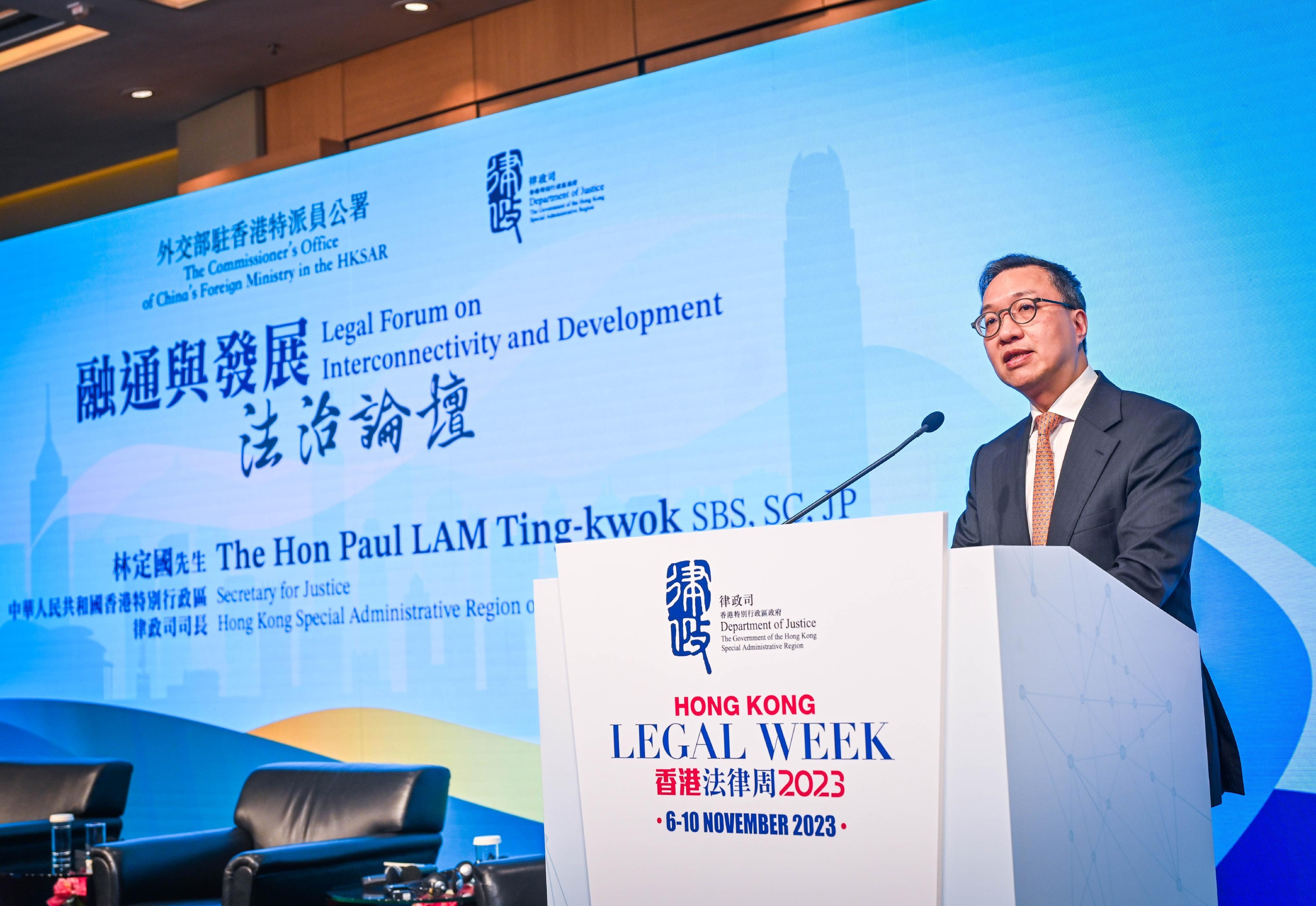 Hong Kong Secretary for Justice Paul Lam Ting-kwok delivers his closing remarks at Legal Forum on Interconnectivity and Development co-organized by the Office of the Commissioner of the Ministry of Foreign Affairs in the Hong Kong Special Administrative Region and the Department of Justice as part of the Hong Kong Legal Week 2023, in Hong Kong, Nov 7, 2023. (PHOTO / HKSAR GOVT)
Hong Kong Secretary for Justice Paul Lam Ting-kwok delivers his closing remarks at Legal Forum on Interconnectivity and Development co-organized by the Office of the Commissioner of the Ministry of Foreign Affairs in the Hong Kong Special Administrative Region and the Department of Justice as part of the Hong Kong Legal Week 2023, in Hong Kong, Nov 7, 2023. (PHOTO / HKSAR GOVT)
Hong Kong’s secretary for justice said on Tuesday that the special administrative region, as an integral part of China, shares China's resolute commitment to upholding the rule of law on a global scale and safeguarding the development interests through legal means.
Paul Lam Ting-kwok made the statement at the conclusion of the Legal Forum on Interconnectivity and Development, which is part of Hong Kong Legal Week 2023. The Hong Kong Legal Week runs from Nov 6 to Nov 10.
Under the principle of "one country, two systems", Hong Kong plays a unique role in the high-quality development of Belt and Road cooperation, he said.
“Being the only common law jurisdiction in China, our judicial system is open, independent and enjoys a renowned international reputation. Our court judgments have garnered recognition in other common law jurisdictions, underscoring our legal influence.”
ALSO READ: Legal summit kicks off to boost HK's superconnector role
Leveraging these inherent advantages, the SAR serves as a ‘superconnector’ between the Chinese mainland and rest of the world, “providing an ideal business environment governed by the rule of law”, said the secretary for justice.
It (Hong Kong) acts as a hub for facilitating seamless connections and fostering an atmosphere conducive to international trade and investment.
Paul Lam Ting-kwok, Secretary for Justice, HKSAR
He also stressed that the Department of Justice remains committed to developing Hong Kong as a center for international legal and dispute resolution services in the Asia-Pacific region in order to support the Belt and Road Initiative and to contribute to higher-quality and higher-level development of Belt and Road cooperation.
Referring to the Law on Foreign Relations which China enacted earlier this year, Lam said, “It is the first piece of basic legislation that fully outlines China's major policies, principles and positions, systems and structures concerning China's foreign affairs and provides the overall rules and regulations on China's foreign relations.”
The law seeks to effectively respond to external risks and challenges while safeguarding the country’s sovereignty, security, and development interests through legal means and seeking to promote friendly exchanges and strengthen global engagements, he added.
The forum – co-organized by the Office of the Commissioner of the Ministry of Foreign Affairs in the HKSAR and the DoJ – attracted more than 700 judges, academics, government officials, and other legal professionals from over 50 jurisdictions, including countries situated along the Belt and Road route such as Saudi Arabia, Pakistan and Cambodia.
In his welcome remarks, Acting Commissioner Li Yongsheng from the Office of the Commissioner of the Ministry of Foreign Affairs in the HKSRA said China is committed to upholding true multilateralism and safeguarding the law-based international order.
Huang Huikang, a member of the United Nations International Law Commission, delivered a keynote address at the forum on the milestone of China's legislation on foreign relations.
Among other topics discussed were the joint construction of international economic and trade rules, development of dispute resolution for investment disputes, use of mediation in promoting high-quality Belt and Road cooperation, and consideration of Hong Kong's role in strengthening legal safeguards under the Belt and Road Initiative.
READ MORE: BRI fuels HK's global legal, dispute resolution business
The discussants also touched upon issues including the avenues and legal instruments in addressing external challenges such as unilateral sanctions and long-arm jurisdiction as well as discriminatory measures, citing the case brought by Hong Kong, China against the United States in relation to the origin marking requirement imposed on Hong Kong products by the US.
There was also an exchange on China's foreign relations law and the extraterritorial application of Chinese law, and the role of private international law in promoting the high standard of China's opening-up.


